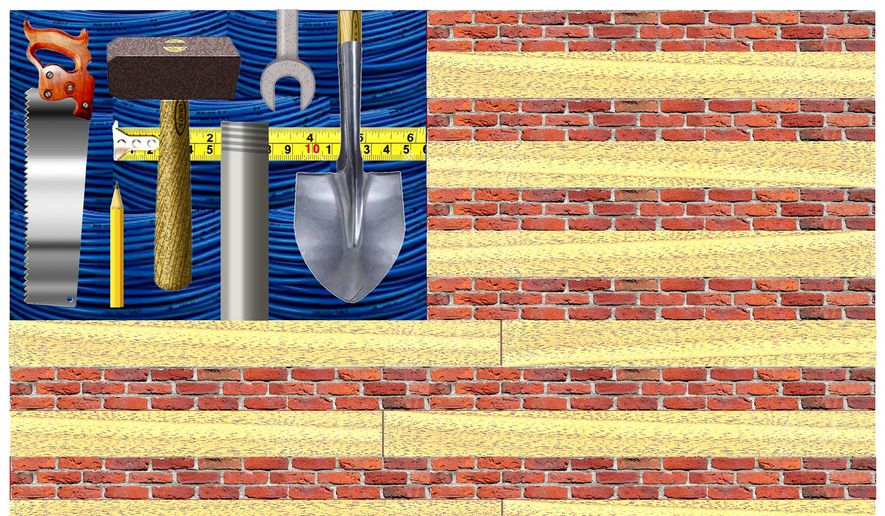OPINION:
The Davis-Bacon Act — which requires that contractors on federally-funded construction projects must pay at least the local “prevailing wage” and provide at least the local “prevailing benefits” — significantly inflates federal construction costs and has always been protectionist, as opposed to good economic policy.
Rep. Bob Good, Virginia Republican, just introduced a bill that would “cancel” the Davis-Bacon Act.
Although Congress has considered eliminating the Davis-Bacon Act before, now is the perfect time to prevent taxpayers from massively overpaying for President Biden’s proposed $2 trillion infrastructure plan, while also eliminating what’s been referred to as the last Jim Crow law on the books.
Congress passed the act in 1931 to preclude non-unionized Black and immigrant workers — many of whom migrated to the North to look for work during the Great Recession — from receiving jobs on federal construction projects.
During the 1931 legislative debate over the Davis-Bacon Act, Rep. Miles Allgood, Alabama Democrat, said, “That contractor has cheap labor colored labor … and it is labor of that sorts that is in competition with white labor throughout the country.” And American Federation of Labor President William Green lobbied for the bill, complaining that, “Colored labor is being sought to demoralize wage rates.”
While the act no longer aims to discriminate against Black workers, some of its consequences remain. A study of state-based “prevailing wage” laws found that repealing those laws caused a “significant narrowing of the black/nonblack wage differential for construction workers.”
Most importantly, the Davis-Bacon Act drives up federal construction costs by about 10%, costing taxpayers an estimated $10.9 billion per year.
In contrast to tax-free shopping holidays, the Davis-Bacon Act is effectively a tax-on-a-tax. The Davis-Bacon slogan should be “We guarantee the highest prices in town.” (And as federal taxpayers, you are not free to shop elsewhere.)
With Mr. Biden’s $2 trillion infrastructure plan calling for more than $1 trillion in federal construction spending, the consequences of paying a roughly 10% premium are enormous.
The federal government should pay market wages. The problem is that the Davis-Bacon Act calls on the government to substitute its own contrived definition of a “prevailing wages” for the actual market wages.
The Government Accountability Office and the Office of Inspector General have repeatedly criticized the Department of Labor’s Wage and Hourly Division for their survey methodology, including using non-scientific, self-selected, and small samples to estimate wages, and allowing 100% error rates in surveys.
A sample of the effects of COVID-19 on 100 young and healthy individuals would tell little about the virus’s total risks. Similarly, non-scientific samples of construction wages tell little about overall wages.
The Government Accountability Office found that Davis-Bacon calculations were both non-representative and too small to provide meaningful estimates. The surveys routinely rely on samples of fewer than 30 — and almost exclusively unionized — workers. More than 1 out of 4 “prevailing wage” estimates were based on samples of six or fewer workers.
In direct contrast to scientific statistical analysis, the wage and hour division also completely ignores non-returned surveys, instead of weighting other responses to create a representative samples. This would be like polling 100 Democrats and 100 Republicans about who they plan to vote for in an upcoming election and — based only on the returned responses of 50 Democrats and 75 Republicans — concluding that the Republican candidate would win.
The result of these nonscientific methods is Davis-Bacon wage rates that don’t match reality. In most instances, Davis-Bacon wages are highly-inflated.
In 2011 congressional testimony, Heritage Foundation economist James Sherk provided examples of market-based and Davis-Bacon wages: In Nassau-Suffolk, N.Y., Davis-Bacon wages are 30% above market wages for carpenters, 45.5% above market wages for electricians, and 58.7% above market wages for plumbers/pipefitters.
In Spartanburg County, S.C., however, Davis-Bacon wages are 52.9%, 55.1% and 64.1% below market wages, respectively, for carpenters, electricians and plumbers/pipefitters.
These non-representative Davis-Bacon wages result in incredibly unequal federal payments for similar jobs performed in different parts of the country. For example, while the market wages for carpenters, electricians and plumbers/pipefitters are 70% higher in Nassau-Suffolk, N.Y., than in Spartanburg County, S.C., the Davis-Bacon wages impose a 487% wage premium for Nassau-Suffolk workers ($43.98/hour) compared to Spartanburg workers ($7.49/hour).
It’s long-past time for Congress to cancel the Davis-Bacon Act and instead allow actual markets — instead of government bureaucrats and non-scientific methods — to determine market wages.
Not only could this help reduce race-based wage differences, it would put an end to artificially-inflated wages, saving taxpayers billions of dollars annually and knocking more than $100 billion off of Mr. Biden’s $2 trillion debt-and-economic-destruction-driven infrastructure plan.
• Rachel Greszler is a research fellow in economics at The Heritage Foundation (heritage.org).




Please read our comment policy before commenting.